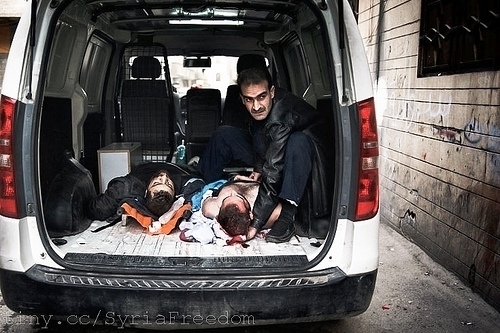Hepatitis, typhoid, cholera, and dysentery. Those are the just some of the diseases expected to continue to spread through Syria. According to Dr. Jaouad Mahjour, a Director at WHO’s Regional Office for the Eastern Mediterranean, “outbreaks are inevitable.” Syria’s health crisis will escalate unless more action is taken. The bulk of this responsibility lies not with brave health workers, but with political and military actors who must be conscious of and accountable for the ramifications of their actions on the health of millions.
Experts are increasingly recognizing that there’s nothing natural about natural disasters. Although earthquakes and floods are natural events, their repercussions are not. Whether or not a drought leads to starvation is a result of government planning, politics, and poverty, among other social and economic factors. In Syria, the rapidly escalating health crisis is very much the result of violence and criminal governmental policies. Despite the persecution of doctors and medical professionals, they are playing a key role not only in rehabilitation, but in important documentation work as well. Their documentation, by identifying and recording violations, is shedding light on the vast scale and scope of human suffering during the conflict.
Syria’s health crisis has worsened dramatically over the last six months. The World Health Organizations reports that acute watery diarrhea increased by 172% since January, while cases of Hepatitis A have tripled. Over 7,000 cases of measles were identified and over 1,000 cases of the flesh-eating disease leishmaniasis were reported from April to May. The WHO also reported that local production of medicine has dropped 90% and vaccination rates continue to drop. This is likely to get worse. As Dr. Mahjour noted, “All the risk factors that enhance the transmission of communicable diseases in emergencies are present in the current crisis in Syria.”
But none of this should come as a surprise. The regime’s own policies of politicizing and militarizing health issues set the stage for health problems years ago. In 2011 Physicians for Human Rights (PHR) reported that government forces denied civilians “impartial medical treatment” by refusing to treat activists, attacked hospitals and ambulances, and detained and tortured doctors for treating civilians. But recognizing the importance of doctors and health workers, PHR is also working with medical professionals and training them on how to identify rape cases, torture, and abuse. PHR’s work strengthens local capacity to demand accountability while dissuading potential perpetrators from committing crimes by showing they can be held to justice.
Actions that violate fundamental rights by politicizing and militarizing health issues must be documented and recognized for what they are: crimes. With Syrians more likely than ever to suffer diseases, it’s important to draw the connection between health crises and accountability for the policies that created them. The government’s destruction of hospitals and targeting of doctors is one example where documenters are making progress. Documenters can also highlight obstructions to medical supply and transportation.
Addressing health concerns should also be a priority in any transitional justice framework. Rehabilitating society will be made much easier when Syrians are healthy and have access to medical necessities. Such assistance could come as part of a reparations program that international actors, many of whom have failed to provide the aid they’ve already committed, should support. Health priorities have often gone overlooked in transitional justice efforts, but their importance cannot be underestimated.
......


